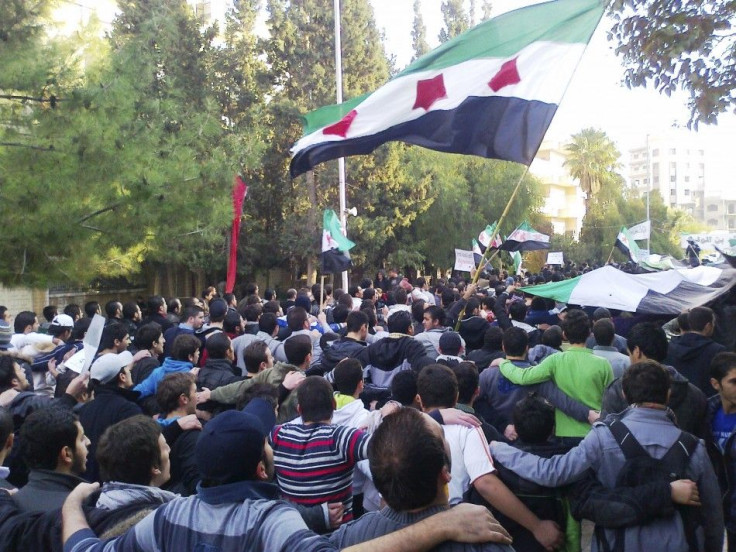Syrian Opposition Says 50 Killed in Homs Assault

(REUTERS) - Syrian forces bombarded Homs on Monday, killing 50 people in a sustained assault on several districts of the city which has become a center of armed opposition to President Bashar al-Assad, the Syrian National Council opposition group said.
The tally that we have received from various activists in Homs since the shelling started at six this morning is 50, mostly civilians, the group's Catherine al-Talli told Reuters.
The regime is acting as if it were immune to international intervention and has a free hand to use violence against the people, she said.
The bombardment came a day after the United States promised harsher sanctions against Damascus in response to Russian and Chinese vetoes of a draft U.N. resolution that would have backed an Arab plan urging Assad to step aside.
This is the most violent bombardment in recent days, said one activist in Syria who was in touch with Homs residents. Another activist said forces loyal to President Bashar al-Assad were using multiple rocket launchers in the attack.
Arab satellite television stations broadcast live footage from Homs. Explosions could be heard and smoke was seen rising from some buildings.
Activists said more than 200 people were killed on Friday night when tanks and artillery blasted the Khalidiya neighborhood of Homs. It was the highest reported death toll in a single day since the uprising against Assad's rule, inspired by uprisings across the Arab world, erupted last March.
Damascus denies firing on houses and says images of dead bodies on the Internet were staged. Reports from activists and authorities are hard to verify because Syria restricts access for independent media.
The latest assault, which began shortly after 2 a.m. (7 p.m. ET) on Monday, appeared to be more widely targeted, with explosions in Khalidiya, Baba Amro, Bayada and Bab Dreib neighborhoods, the activists said.
They want to drive the Free Syrian Army out, said Bab Amro resident Hussein Nader by telephone, referring to the rebel force of army deserters and gunmen who have controlled parts of the city for months.
As well as those killed, 150 people had been wounded, he said. Rockets are falling seconds apart on the same target.
Activists also said Zabadani, a town north-west of Damascus near the Lebanese border which has been largely under the control of Assad's opponents for several weeks, had come under fire on Monday.
U.S. Secretary of State Hillary Clinton said the United States would work with other nations to try to tighten regional and national sanctions against Assad's government to dry up the sources of funding and the arms shipments that are keeping the regime's war machine going.
We will work to expose those who are still funding the regime and sending it weapons that are used against defenseless Syrians, including women and children, she said. We will work with the friends of a democratic Syria around the world to support the opposition's peaceful political plans for change.
Clinton did not say which nations might band together or precisely what they might do. But it appeared that the United States might seek to help organize a Friends of Syria group - proposed by French President Nicolas Sarkozy after the veto - to advance the Arab League initiative given the inability to make headway at the U.N. because of Russian and Chinese opposition.
All 13 other members of the Security Council voted to back the resolution, which would have fully supported the Arab League plan for Assad to cede powers to a deputy, a withdrawal of troops from towns and a start to a transition to democracy.
Russia said the resolution was biased and would have meant taking sides in a civil war. Syria is Moscow's only big ally in the Middle East, home to a Russian naval base and customer for its arms. China's veto appeared to follow Russia's lead.
China's state-run media said Western intervention in Libya, Afghanistan and Iraq showed the error of forced regime change.
Currently, the situation in Syria is extremely complex. Simplistically supporting one side and suppressing the other might seem a helpful way of turning things around, but in fact it would be sowing fresh seeds of disaster, the People's Daily said.
Western anger at the veto was echoed by Syria's Middle East critics, including Arab powers Saudi Arabia and non-Arab Turkey who have turned against Assad in recent months.
Unfortunately, yesterday in the U.N., the Cold War logic continues, said Turkish Foreign Minister Ahmet Davutoglu. Russia and China did not vote based on the existing realities but more a reflexive attitude against the West.
Arab League head Nabil Elaraby said the body still intends to build support for its plan. The veto does not negate that there is clear international support for the resolutions of the Arab League, he said in a statement seen by Reuters.
Syria says it is being targeted by the West and by hostile neighbors providing diplomatic cover for an armed insurgency steered from abroad.
Syrian U.N. envoy Bashar Ja'afari condemned the resolution and its sponsors, which included Saudi Arabia and seven other Arab states, saying nations that prevent women from attending a soccer match had no right to preach democracy to Syria.
(Additional reporting by Khaled Yacoub Oweis in Amman; Editing by Louise Ireland)
© Copyright Thomson Reuters {{Year}}. All rights reserved.





















